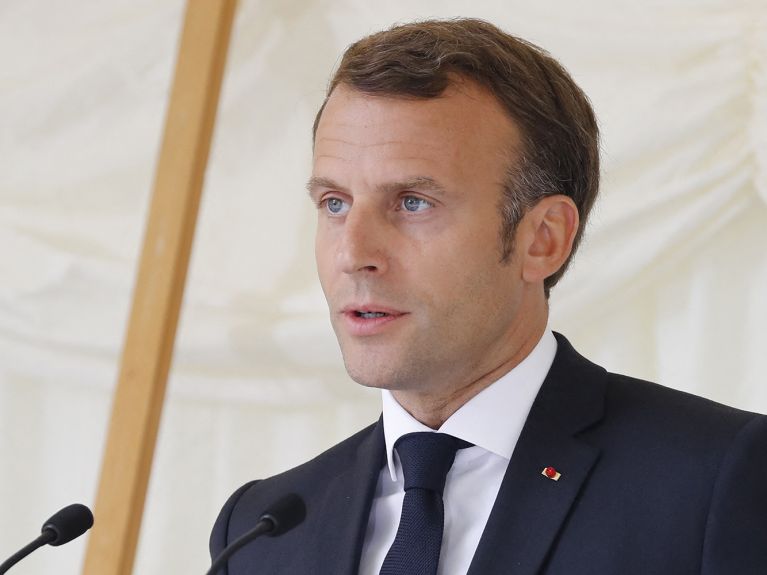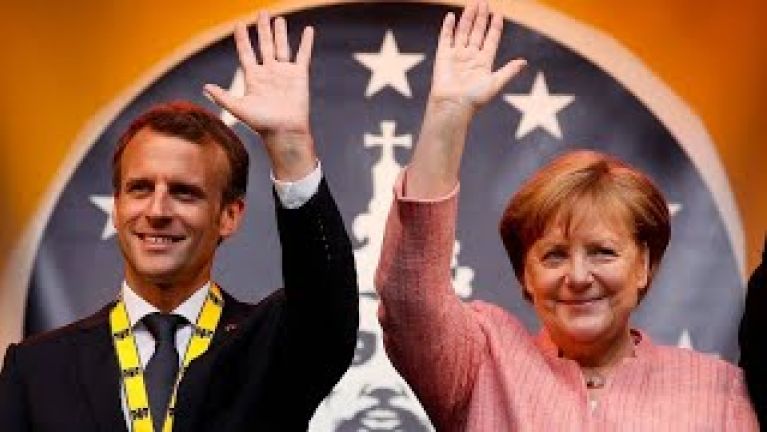A call to action
The Europe of cafés, debates, universities believes in the strength of truth, says Emmanuel Macron.

When defining what the European enterprise has brought us since the end of the Second World War, we usually say it has enabled us to live in peace for 70 years, and it’s true. Europe has experienced the historic miracle of 70 years of peace between the traditional enemies of yesteryear.
And this treasure is priceless, and it’s unprecedented on our continent in all the previous centuries, but if I think about Poland, the peoples of the former Czechoslovakia, Portugal, Spain, Your Majesty, the former East Germany, the Baltic countries, Bulgaria, all those sister peoples, can I say they’ve experienced 70 years of peace in full tranquillity, in full serenity – peace, freedom and prosperity?
Can we say that the peoples of the former Yugoslavia have experienced 70 years of peace? While a few nations of Europe have taken the path of friendship and cooperation, others have until recently experienced the searing pain of totalitarianism, of nationalism, and some others genocide, civil war and military or political subjugation.
Dieses YouTube-Video kann in einem neuen Tab abgespielt werden
YouTube öffnenThird party content
We use YouTube to embed content that may collect data about your activity. Please review the details and accept the service to see this content.
Open consent formThe myth of these 70 years of peace means a perfect Europe of which we need only cherish the legacy, but I don’t believe in this myth, because Europe is still, and always, gripped by history and the tragedy of history. We can counter this not with the routines of management but with tireless determination, requiring each new generation to harness all its strength and reinvent hope.
Today, this dream of European unity is eroded by doubt. It’s for us to decide whether to keep it alive or let it die. I’ve already said several times at the Pnyx, the Sorbonne and the European Parliament what France is proposing, but here I’d simply like to share four strong beliefs, four commandments if you’ll allow me, or four categorical imperatives for action, according to the tradition of our Europe by which we want to abide.
Let’s not be weak and let’s not be passive!
The first imperative is simple: let’s not be weak and let’s not be passive! We’re facing major threats, major imbalances that are unsettling our people and adding to their worries every day. The question being asked of each one of us is: do we want to be passive? Do we accept others’ rules or the tyranny of events, or do we make the choice to decide for our fellow citizens the rules that protect their private lives? Who will choose to explain the economic balance in which our businesses will have to exist? Foreign governments which, in fact, will organise their propaganda or their own rules? International players who have become clandestine passengers of a system they choose because they organise it? Or do we believe this is a matter of European sovereignty?
The European Parliament made the brave choice, supported by the Commission and the member states, to decide on general regulations for personal data. That’s the direction we want to go in, and I believe profoundly that we have to build digital sovereignty in order to better regulate those players, protect our fellow citizens, more fairly tax those who currently pay no tax, in an economic and legal area where they’re nevertheless bringing about profound transformations and, every day, threatening the interests of some while providing opportunities for others.
How do we want to make our climate choices tomorrow? And they’re democratic choices; we can hear this echo beyond these walls; they’re essential. Who will have to decide on this? Again, external powers or ourselves? We know these choices take time when it comes to energy and the climate, but the sustainable solution will be achieved only if we can organise ourselves at European level, if we can move towards a carbon price floor, introduce a tax at our borders too, avoid choosing the worst and favouring the least cooperative players, have an ambitious policy as regards renewable energy storage, which alone will enable us to begin a new chapter in our energy adventure and be equal to our climate commitments.
We Europeans are the joint custodians of an international multilateralism that I believe to be strong.
Who must decide on our trading decisions? Who? The people threatening us? The people who would blackmail us, explaining that the international rules they helped draw up are no longer valid because they’re no longer to their advantage?
We Europeans are the joint custodians of an international multilateralism that I believe to be strong. For the sake of our own sovereignty, it’s up to us to defend its rules, not to give in, and to be neither naïve in the face of unfair competition nor weak in the face of the threat from those who sometimes wrote these rules with us.
Who will choose the environment of peace and major geopolitical balances that we want to live in? As heads of state and government, we have chosen to build peace and stability in the Middle East, taken this on board in full sovereignty and promoted it collectively. Other, equally sovereign powers have decided not to keep to their own word. Must we therefore give up our own choices? Must we give in to the politics of the lowest common denominator? We must choose, built, talk to everyone, in order, again, to successfully build our own sovereignty, which, in that region, will be a guarantor of stability.
European sovereignty
We’ve had to live through major upheavals linked to contemporary migration, be they political, economic or climate-related. On this issue, do we think for a single second that we can stand idly by or, again, withdraw into purely nationalistic beliefs? The answer is European, it’s European to its very core. We’ll face up to these challenges only by having an ambitious, concerted and fully European policy for Africa, on the other side of the Mediterranean, a development and security policy which we’ve started to work on but which we must be much more ambitious for, by having a common policy on security for our borders and the harmonisation of our rights, and by having a sovereign policy for development, security and protection.
As you’ve understood, this first imperative that I believe in – let’s not be weak, let’s not be passive – is that of European sovereignty, the sovereignty that must guide us, the sovereignty that must guide us to make Europe a geopolitical, trading, climate, economic, food and diplomatic power of its own. We’ll have debates, and we probably don’t have the same situations in mind when we utter each of those words, but the precondition is that we refuse to allow others to decide for us. If we decide that a major digital player can decide on secrecy or tax rules, we’re no longer sovereign and the debate is invalid; if we decide that such-and-such a major international energy group decides on our climate policy for us, we’re no longer in a position to decide and to have a democratic debate.
And if, in the toughest times in our history, we agree to other major powers – including allies, including friends – putting themselves in a position to decide for us, for our diplomacy, our security sometimes, creating the worst risks, then we’re no longer sovereign and we can no longer credibly look at our public opinion, our people and say to them: we’re going to decide for you, come and vote, and come and choose.
Let’s not be divided!
Our second imperative is: let’s not be divided. The temptation is great, in this troubled period of self-absorption and nationalism, to think that at national level we’ll control things better and regain a share of this sovereignty, which is still too ephemeral or nascent at European level. We had this alarm bell with Brexit, but we’re also hearing it from the Italian elections to Hungary, Poland and everywhere in Europe: this music of nationalism reverberates, this fascination, and as I was saying earlier, in this place we’re in the presence of the Carolingian dream we want to live up to, but the risk in Europe today is, as it were, a Lotharingian risk, the risk of extreme division. It tends to reduce most debates to overlapping nationalisms, persuading those in doubt to give up the freedoms they won at the cost of huge suffering.
Many would like to see history repeating itself and have our peoples believe we’ll be more effective this time. In the face of all the risks I’ve just described, division would be fatal; it would further reduce our actual sovereignty. Barbed wire is reappearing everywhere across Europe, including in people’s minds, and let’s take a clear-sighted look at recent years, the last ten years we’ve just been through: a lot has been done, and we owe a great deal to those who had the honour of leading our countries, facing up to crises and, in the most extreme situations, taking decisions that were difficult each time, but it was at the cost of division between North and South, at the time of the financial and economic crisis. Then it was at the cost of division between East and West, at the time of the migration crisis. And those arguments remain like a cancer in the midst of our Europe, seeking to implant the idea that separate camps have been rebuilt and that unity is no longer possible.
Our only solution is unity; divisions push us only towards inaction. Divisions push us into siege warfare.
But our only solution is unity; divisions push us only towards inaction. Divisions push us into siege warfare, the very same that made Europe suffer one of its worst torments a century ago now. And I know all those collective representations that call on us not to budge, including between our two countries. I know all those in France who say to me: go on, go and confront Germany, the solution lies in a crisis with Germany, Germany is selfish, it’s ageing, it doesn’t want to reform Europe, it wants Europe when it’s advantageous to it. I know that’s false, and we’ll never give in to that temptation, because I’ve seen a Germany which, in recent years, has taken its risks and made its choices and which, before the financial crisis, introduced radical reforms that we thought we could postpone, and in recent days I’ve seen again an ambitious Germany, loving Europe, acclaiming Europe, and young Germans who expect almost everything from this Europe because they remember its history!
On the other side, I also hear those in Germany who say: let’s not give in to the siren voices of a France we know all too well, those people aren’t serious, they haven’t carried out their reforms, and France is demanding of us a Europe that would be in its hands, in a way, it wants a Europe for itself, a Europe that will finance its deficits, a Europe that will enable it to introduce the reforms it can’t carry out. But wake up! France has changed, it’s no longer the same, and that was the choice of the French people, who – almost exactly a year ago now – made a clear decision to do what I’m the custodian of and nothing more. But France has carried out its reforms, which were so long-awaited; it will continue to carry them out. It’s got back on its feet, it’s here; during the crises it paid its share, just like Germany, and France would like a Europe for Europe, not for itself. And so on either side, we must also be able to overcome the self-absorption, the music that was leading us in the worst direction, in order to endorse one thing, namely that unity between France and Germany is the precondition for European unity, which is the only thing that will enable us to act!
Constant solidarity
And let’s make no mistake. Our dream is already more than the Carolingian dream; for centuries and centuries in our Europe there have been transfers of empires, which, each time, have led to a search for the hegemony of one over others. They’ve led us to bad decisions each time. France itself, at the beginning of this century, when it was doing well, thought there was no need to reform itself or respond to the European proposals made by Germany, because this Europe suited us, it was beneficial to us. That was a mistake.
Our Europe no longer functions on the basis of successive hegemonies. It can no longer function on this basis. It can build itself only on constant solidarity. There’s the essential responsibility we sometimes lost sight of before the crisis and which we’ve rebuilt, and each state has to take on its reforms, its share of responsibility, its own decisions, but we also have solidarity between ourselves, the solidarity which Germany, at the time of reunification, benefited from, and Europe’s duty in order for Germany to take that step then – to be stronger and to play the role it does today –, the solidarity we must show today on migration within Europe, the solidarity we must show on financial issues within Europe, solidarity with the countries which still have youth unemployment rates of up to 30%, 40%, 50%, we must rebuild that solidarity!
Otherwise, we’d take the risk each time of giving in to the siren voices of the ‘haves’, forgetting the precarious nature of those European hegemonies. That’s why I believe in a much more ambitious European budget in which France will contribute its share, promoting the strength of our historical policies but also the new policies the Chancellor mentioned earlier, promoting an ambition to uphold the rule of law, champion economic, fiscal and social convergence and a coherent vision of our Europe, the Europe that reflects the ambition not only of the founding fathers but also those who created the Single European Act. That’s why I believe in a stronger, more integrated Euro Area with its own budget, enabling investment and convergence, because that’s the only way to let all countries that wish to do so move forward, move in that direction.
Let’s not be afraid!
Our third imperative, my friends, is: let’s not be afraid, let’s not be afraid of the world we’re living in, let’s not be afraid of our principles, let’s not be afraid of what we are, and let’s not betray it. Today we’re facing all kinds of anger and uncertainty, and confronting temptation, sometimes of the worst kind: the temptation to abandon the very foundations of our democracies and our rule of law. Let’s not give up any, any of it!
It’s not true that we’ll respond to ill winds by being indulgent to those who, in the past, have already led us – sometimes through weakness or silence – to betray what we are; let’s give up none of the rule of law or all these rules, either in the European Union or the Council of Europe. Let’s give up none of our democracies’ vitality or our democratic debates, the disputes that drive them, their strength, or our Europe’s civility.
This civility is the Europe of cafés, debates, universities, the conflict of ideas, the opposition of ideas that rejects both state violence and street violence but believes in the strength of truth because it believes in the strength of the democratic confrontation of ideas.
The power of culture
That’s why I believe in the power of intelligence, the power of culture, because yes, it is indeed about willpower. There’s always this stagnation, there, under our feet, and we need this power of intelligence, of what is beautiful, of culture, not to make people forget it but to create spaces in it – like this space we’ve been living in for 70 years –, which are not obvious, which are not the natural state of European humanity, which are an exception linked to our strength of mind. So yes, fighting for a European academy of culture, fighting for European universities, fighting for translation, fighting for the movement of artworks, fighting each time to reinvent this aesthetic, critical, intellectual debate in our Europe – these are not fine ideas reserved solely for a few intellectuals: they’re ideas essential for our societies, for our young people, because today, even more than yesterday, it’s the strength of mind created by this space opened up 70 years ago that we’re fighting for.
The Middle East and Africa are watching us. They’re looking at this path, at this capacity for not being afraid, not fearing the Other and promoting what has always been at the heart of our destiny, an element of the universal. The world has always been thought of in terms of Europe and its capacity for being unafraid, exchanging ideas, having debates. I mention these periods without being naïve; we’ve changed since, but that’s Europe – the capacity every time for engaging in a dialogue of the universal and being a mediator for the universal.
A vision of the world
And as we talk to each other at this moment Europe is experiencing, we aren’t just talking about the debate on sovereignty I mentioned earlier, but also about not being afraid to continue promoting this strong multilateralism I believe in, i.e. Europe’s ability to put forward rules for the whole world, because it is able and has a duty to promote within itself a vision of the world and the requirement which goes with this vision of the world.
Not being afraid – at least, of ourselves –, and freeing ourselves from our own taboos means us not being afraid; it means not being afraid of one another; it means not being afraid sometimes of our own obsessions. In France, people say the treaties mustn’t be changed any more, we also mustn’t reduce public spending any more, and we have a classic preference for public spending rather than complying with standards, and so let’s agree to shake up these obsessions and not be afraid to say yes, to move forward in Europe we must at some point be prepared to shake up the treaties, change them and take this democratic risk. Yes, I’m prepared to say that we must carry out in-depth reforms and make radical changes to reduce public expenditure, which is the only condition for moving forward in this Europe and complying more with standards, building these common rules; but in the same way in Germany, there can’t be a permanent obsession about budget and trade surpluses, because these are always at the expense of certain others. And so now let’s not be afraid of putting our own taboos, our own habits behind us precisely because we’ve got to fight for something which is greater than ourselves! We’ve got to fight, not for our countries’ interests or for protecting a particular European state – no! We’ve got to fight to forge a new, stronger Europe again and, with it, promote that element of the universal which is in Europe’s hands today.
We mustn’t wait – the time is now!
Finally, I believe the last imperative is that we mustn’t wait and that the time is now! We’ve waited a long time for one another; it’s even possible that we may have sometimes passed one another by. There’s shared blame, but today we no longer have the right to wait; let’s lose no time today in choosing Europe because when we do so – as we’ve clearly seen and have each reiterated – we choose the West too. That’s also what we’re supporting, the ability we’ll have to make clear choices, not just to move towards a Europe of maybe a few for a time, maybe a more integrated circle because that’s the way it has always moved forward, and it leaves the door open. I don’t believe in a Europe that’s shut off, having predefined an exclusive club, but nor do I believe in a Europe that can wait perpetually for yesterday’s 28, tomorrow’s 27 or others after then to all agree on absolutely everything.
We need to formally acknowledge – because this is always how we’ve moved forward – that a few have the strength of mind, the temperament, the determination to forge ahead, if the rules are clear: the door is left open so that everyone, whenever they are able and willing, can join them. But we can’t think that choosing Europe always means choosing only the lowest common denominator, choosing what’s least risky, choosing to take the tiniest step at the last minute – no! We’ve got to build an ambitious choice for ourselves by offering our fellow citizens a vision again, one for the next 30 years, which will subsequently allow such small steps and progress because they need a course of action, because the nationalists are clear, because the demagogues are clear, because there are clear fears. Those championing Europe must do so just as forcefully and ambitiously.
So together let’s commit to a Europe that protects and promotes this ambition, a digital Europe, one of energy and climate transformation, one that bolsters the Euro Area and has a trade policy that is more protective and consistent with our health and environmental goals, a more unified migration policy, social, fiscal and democratic convergence, a policy of intelligence, research and innovation with this new approach – a determined one, which no doubt goes with a form of risk taking.
Let’s never lose sight of the fact that the Europe we’re talking about is anything but self-evident.
Let’s not be weak but make a choice; let’s not be divided but unite; let’s not be afraid but be bold enough to do things and live up to our histories; and let’s not wait, let’s act now.
When, nearly 70 years ago, the Swiss philosopher and promoter of European federalism Denis de Rougemont suggested taking a huge step with a charter of rights, people said, ‘He’s an intellectual, a poet, this won’t happen’. But we did it – maybe you had to be a man of letters or an artist to dare suggest it. Utopians are pragmatists and realists.
So let’s try and stick to these four imperatives and map out together for Europe the 30 years ahead of us, and let’s do so now because we mustn’t ever lose sight of the fact that some of us for the past 70 years – for others it’s been a little less – have been living a kind of historical exception. Let’s never lose sight of the fact that the Europe we’re talking about is anything but self-evident. It’s probably one of the most fragile things, and let’s never forget that languidness, selfishness and old habits may pose some of the worst threats to it.
Emmanuel Macron has been President of France since May 2017. This article is based on his acceptance speech when awarded the Charlemagne Prize in Aachen and was taken over from the Culture Report Progress Europe 2020, which is published by ifa (Institut für Auslandsbeziehungen).
https://www.ifa.de/en/news-listview/news-detailview/reset-europe-when-if-not-now/



